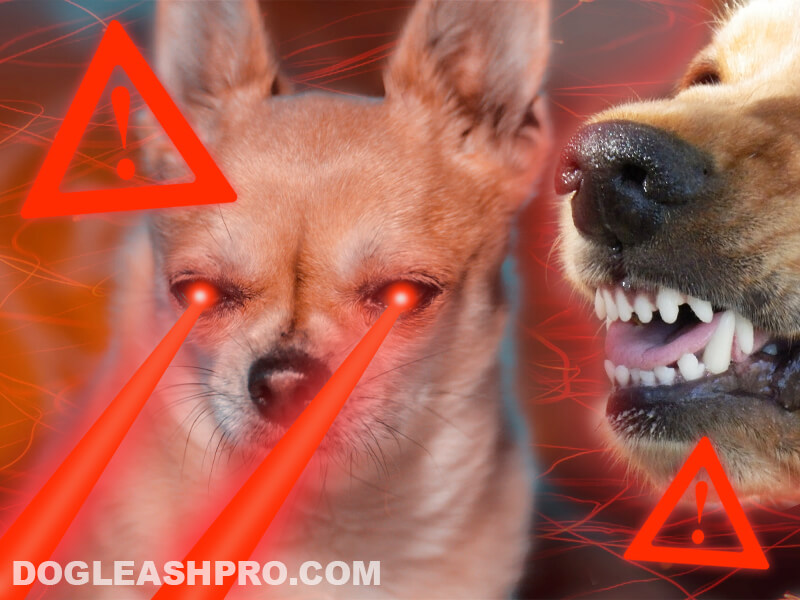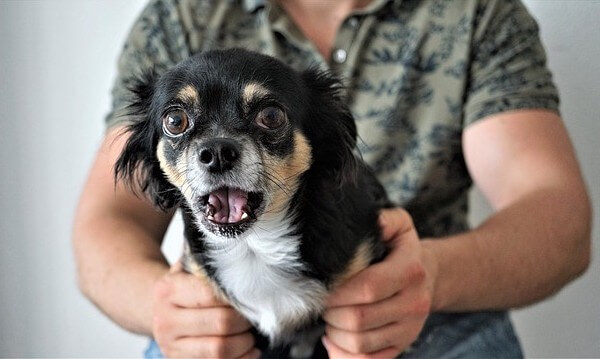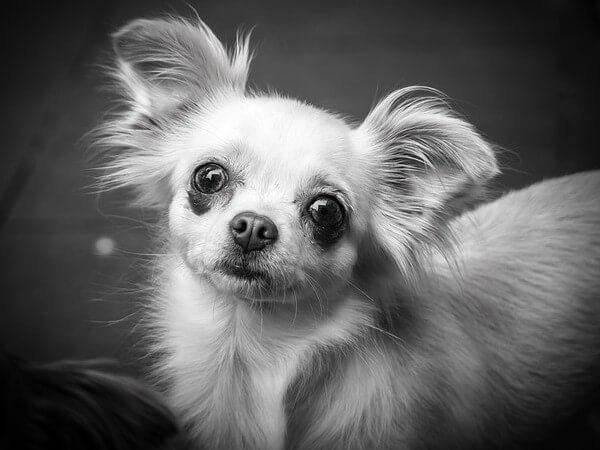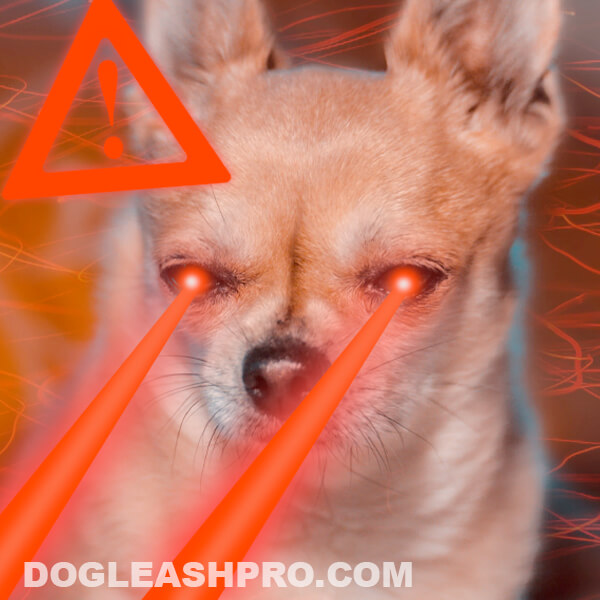
You’ve probably seen many videos of aggressive Chihuahuas online or have come across one in person. Was it something you did that triggered them or are Chihuahuas naturally aggressive in nature? We’ll discuss everything you need to know about why Chihuahuas are aggressive – from territorial behaviors, anxiety, and many more!
Why are Chihuahuas so aggressive? Chihuahuas are so aggressive because they are instinctively protective of their space and their owner, which makes them great guard dogs. They are small dogs with large and feisty personalities. Chihuahuas aren’t afraid to bite or bark if a stranger comes close to them or their owner. Patience is key as it may take months for Chihuahuas older than 1-year-old to trust and warm up to people.
Table of Contents
Why Are Chihuahuas So Aggressive: 7 Reasons Why
There are many reasons that would trigger a Chihuahua to be so aggressive. When I first met my friend’s Chihuahua, I was welcomed with nasty barking and an attempt to bite my heels. You could say I was not welcomed.
The first few months I visited her, I was met with unpleasant barking. However, after continuous visits that included feeding her food, she began to warm up to me. 9 months later, she allowed me to pet her (with my friend there, of course!). So I can personally say that Chihuahuas are mean to strangers, but they are the nicest once they get to know you and are familiar with you.
With that, let’s dive right into the 7 reasons why Chihuahuas are so aggressive.
1. Chihuahuas are protective of their territory
Chihuahuas are great guard dogs because they are naturally protective of their space and territory. When they meet strangers (whether at home or in the dog park), they become defensive and are ready to attack if they have to.
Since Chihuahuas are highly territorial, we advise that unfamiliar faces or strangers do not come towards them when they are resting in their favorite space. They have claimed that space as theirs and only allow their owners to enter that space. They also feel protected in that space and any stranger that enters that space is crossing the boundary.
I remembered when my friend’s Chihuahua would lie on her favorite dog bed in the corner of the living room. I walked in that direction in order to turn on the lamp as it was getting dark. Immediately, her Chihuahua stood up, growled, and snapped at me so loud that I was startled and ran towards the kitchen as fast as I could. I didn’t expect that.
Luckily, now I’ve learned many warning signals to look out for and would like to share them with you so you can avoid this situation:
Chihuahua growling
When a Chihuahua starts growling, you’ll first hear a low-pitch “grrr” sound. This is a warning for you to back away before they start attacking. If you continue to stand there, their growling starts to become high-pitch. Chihuahuas will growl if they feel afraid (especially if you are a stranger to them) and they want to intimidate you.
Chihuahua showing teeth
After the growling stage in order to intimidate you, a Chihuahua will start to show his teeth. This is another warning sign to tell you to back away and not to enter their territory. If you don’t obey, they will see you as a challenge and will start to launch at you and bite you.
Chihuahua dog stiff body posture
But before they launch at you, a Chihuahua dog will get into that stiff body posture. A Chihuahua dog’s stiff body posture means that he is angry with you and he feels confident he will defeat you.
What you can do in this situation is to avoid making any eye contact with the Chihuahua as eye contact can be seen as intimidating a dog. Slowly and softly walk away from the Chihuahua.
Chihuahua muzzle punch
A Chihuahua’s muzzle does more than sniffing, it can punch a stranger’s heel or feet before biting.
I remember trying to feed my friend’s Chihuahua. Instead of putting the chicken meat in her food bowl, I put the chicken on my plate before setting it on the floor. I walked away to give her time to sniff and eat, but when I came back, the food wasn’t touched.
As I picked up my plate of chicken and relocate it to her food bowl, she felt offended as though I was taking away her food. The small pooch chased me around the house and then booped my ankle. The lesson learned here is don’t mess with a Chihuahua’s food!
Fun Fact: Have you ever wondered what the bite force of a Chihuahua is? Check out our article, Chihuahua Bite Force PSI and you’ll be pleasantly surprised!
Chihuahua’s tail stops wagging
Most people know that a wagging tail dog is a happy dog. When a Chihuahua feels threatened or scared, their tails stop wagging and will stand still.
How the tail is positioned tells you a lot about how a Chihuahua is feeling. If they feel threatened, they feel defensive and their tail will become stiff.
2. Chihuahuas are not great with strangers

Chihuahuas have only one favorite in their lives and that is their owners. They are highly protective of their owners and will bark and snap at strangers.
As you can see, Chihuahuas do not like new faces, whether it is people or other dogs. In fact, new faces can be scary for your Chihuahua and he will defend himself by acting aggressive.
If you have a friend that will be coming over frequently, ask your friend to be patient with your Chihuahua. It is normal for Chihuahuas to take time to get used to your friend. From my experience, it took up to 9 months before my friend’s Chihuahua warmed up to me.
During your Chihuahua’s puppy years, it’s best to socialize them. This will help your Chihuahua puppy understand that it is ok to meet new people, dogs, and places and there is no need to be aggressive. We recommend that you bring your Chihuahua puppy out to a dog park at least once a week with other dogs so he or she can get used to seeing new dogs and people.
Remember, a Chihuahua will become aggressive if things seem scary to them. It’s their defense mechanism so it’s best to socialize them so seeing other dogs, people, and places don’t scare them.
Tips on how to stop this aggressive behavior in Chihuahuas:
Bring your Chihuahua to a pet daycare
Pet daycare is a wonderful way to socialize your Chihuahua. Look for a pet daycare that knows how to handle Chihuahuas. When your small pooch becomes comfortable with meeting new people and dogs, they will feel less afraid and as a result less angry.
Ask the pet daycare center if they offer the following:
- Socialized playing. Chihuahuas will learn to get along with other dogs. If you’re expecting to bring home another dog that is large, socialized playing can help your tiny pooch adjust to your new dog fairly quickly.
- Obedience training. Ask the daycare center if they have any personalized sitters who can train your Chihuahua. This will help control your Chihuahua’s nasty aggressive behavior. Since Chihuahuas like a peaceful and calm environment, avoid bringing your Chihuahua to the daycare center for more than 3 days a week.
- Agility training. Since Chihuahuas are small and light, they can also be quick runners. If your small Chihuahua is very active, have them participate in agility training. This will help them build strong muscles and prevent canine obesity.
You might also want to read: Chihuahua Growth Stages
3. Chihuahuas with dominant personalities and attitudes
We wrongfully assume that since Chihuahuas are small, that they are cute and nice. However, while Chihuahuas are great and nice dogs, they can have a dominant attitude. They are brave and not afraid to show others that they can be in full control.
When your Chihuahuas are puppies, make sure you show them who’s boss. If not, a Chihuahua can walk all over you and they are not afraid to do so. It’s important that Chihuahua owners train their young Chihuahuas to lessen this dominant attitude in their Chihuahuas.
During training, be firm and stand your ground. This will help your Chihuahua learn that no means no through your demeanor and both physical and verbal commands.
4. Chihuahuas with anxiety
An anxious Chihuahua can become aggressive. They will bark loudly as a way to defend themselves and get their owners’ attention.
A Chihuahua can have anxiety from the following:
Separation anxiety in Chihuahuas
Chihuahuas do suffer from separation anxiety if they are left alone for many hours. Chihuahuas love to be with their owners and you’ve probably seen videos of Chihuahuas crying when their owners leave for work.
Be sure to ask your vet or hire a professional Chihuahua trainer to help with your small pooch’s separation anxiety especially if you work full time and will have to leave your Chihuahua at home for more than a few hours.
If this anxiety issue doesn’t get resolved, it could lead to your Chihuahua chewing on furniture, scratching on floors, doors, and toilet papers, and breaking things around the house.
Alternatively, you can bring your Chihuahua to a daycare service with other dogs so he or she does not feel alone and ignored.
Loud noises can scare your Chihuahua and cause anxiety

This one may not be news to you but it is true that loud noises like fireworks, thunder, construction work, and heavy rain can scare your tiny Chihuahua.
Be sure to speak with your vet on how to help your Chihuahua if he is scared of loud noises.
Past traumas
Past traumas can trigger aggressiveness in your Chihuahua. If they have flashbacks of a scary past experience, then they will react by being aggressive.
Let’s discuss this one in more detail:
5. Past abuse can affect a Chihuahua’s aggressiveness
Like humans, Chihuahua dogs can also have Posttraumatic Stress Disorder or PTSD. If a Chihuahua came from a family that was abusive to him, he may have flashbacks of that threatening and traumatic experience.
If you’re planning on adopting a Chihuahua, make sure you are familiar with who his past owners and veterinarian were. This will help you understand your Chihuahua’s aggressive behavior and know what may trigger your new Chihuahua dog to be mean so you can avoid any potentially threatening situations.
Handy Tip: Chihuahuas generally hate grooming sessions, especially getting their nails clipped. Our Chihuahua wails like a baby, snaps, and barks every time we try to trim her nails. Luckily, we found a quiet and soft dog nail grinder that helped and she handles nail trimming much better now.
6. Dislike new or unfamiliar places
Chihuahuas dislike being relocated to new places frequently. Rather they like to feel secure and stable in their current place. A new place means new sounds, smells, people, animals, pets, and new favorite spots.
If you are moving to a new apartment or house, make sure to slowly introduce it to your Chihuahua. Introducing everything new at once can overwhelm him. If you’re in a new apartment or house, establish your Chihuahua’s favorite spot by using a crate. If you have to crate train to get your Chihuahua to feel comfortable and secure in that spot, you can do so.
While moving, using a mobile crate can help your Chihuahua feel more relaxed and calm. Before you move, make sure you have one handy and allow your Chihuahua to feel comfortable with it.
7. Health Problems in Chihuahuas
There are several health problems that are common in Chihuahuas. Unfortunately, when our Chihuahuas are in pain, they don’t show it as humans do. It’s just how dogs are. They’ve evolved to be brave in order to survive predators for many generations.
This makes it extremely difficult for Chihuahua owners because they don’t notice the health problems until it’s too late when their small precious pooch is in extreme pain.
Handy Tip: In our Chihuahua Health Issues: Complete Guide, we listed several health issues Chihuahuas are susceptible to and discussed them in detail.
Because Chihuahuas are prone to several health issues, it’s important that Chihuahua owners have pet insurance. Health problems can creep up at any time and it can cause behavioral changes in dogs.
If you try to pet them in an area that is injured or that hurts, they may react by being aggressive like showing their teeth, barking, or biting.
If you notice a change in behavior or your Chihuahua is crying more often, we highly recommend that you bring him or her to the vet immediately and have a full check-up for any health problems.
Why are Chihuahuas so mean?
If your Chihuahuas are mean, it could be due to hormonal changes. If you have a female Chihuahua dog, ask your vet if spaying her would help. On the other hand, if you have a male Chihuahua dog and you don’t plan on breeding, then you can consider neutering to lessen their aggressiveness.
Chihuahuas can be mean if they have the urge to reproduce and you prevent them from doing so. This can happen if you have many dogs at home. If you do have more than one dog at home, it may be a good idea to consider spaying or neutering. That way, you won’t be surprised with an unwanted litter of Chihuahua puppies.
There are also a few other reasons why Chihuahuas appear to be so mean. Let’s take a look at why many people see Chihuahuas as mean dogs.
Chihuahua’s small size
Chihuahuas can appear to be so mean to strangers. That’s because Chihuahuas are small dogs so everyone and everything they see appears to be larger and bigger than them. This perspective can make them feel intimidated, threatened, nervous, or anxious.
Due to this, Chihuahuas may turn to aggression as a way to defend themselves. When Chihuahuas turn defensive, you’ll know because their behaviors look predatory and thus make them appear mean, aggressive, and rude for a small dog that looks cute and nice.
Lack of socialization and training in Chihuahuas
It’s ideal when Chihuahua owners train and socialize their dogs when they are puppies. The ideal time for socialization is between 7 and 16 weeks of age. That’s because when Chihuahuas are puppies, it is easier to socialize them with other pets in the house, other dogs (big and small), as well as strangers. This will help desensitize them and get them used to seeing and meeting strangers and other dogs and animals.
We highly recommend that Chihuahua owners socialize their small dogs during puppyhood so that their Chihuahuas can grow up nicely and won’t bark at strangers or other dogs.
Sometimes Chihuahua owners see their small pooch as cute and precious and end up spoiling them. Most of the time Chihuahua dogs do end up getting their way because it may seem harmless to the owners and some owners don’t try to train their Chihuahuas at all.
Are chihuahuas aggressive?
Chihuahuas appear aggressive because they are inherently protective of their territory and highly protective of their owners. Being aggressive by showing their teeth, growling, barking, and biting is a way to defend themselves when they feel scared and need to protect themselves.
However, once the Chihuahua warms up to you, you’ll realize how nice they really are. It’s important that any new strangers stay calm and patient when there is a Chihuahua around.
Dog owners can also buy a muzzle for their Chihuahua if a stranger is coming over to visit. However, this is most effective if you’ve muzzle trained your Chihuahua before. Be sure to get a muzzle that is appropriate and comfortable for your small pooch.
Related Questions
Many studies have suggested that Chihuahuas are more aggressive than Pit Bulls. Chihuahuas also tend to be more aggressive when they meet bigger dogs and strangers they’ve never seen before or are unfamiliar with. They will react by biting, barking, and launching towards the strangers’ heels.
DISCLAIMER: THIS WEBSITE DOES NOT PROVIDE MEDICAL ADVICE
The information, including but not limited to, text, graphics, images and other material contained on this website are for informational purposes only. No material on this site is intended to be a substitute for professional veterinary advice, diagnosis, or treatment. Always seek the advice of your veterinarian or other qualified health care provider with any questions you may have regarding a medical condition.
Resources:
https://source.colostate.edu/pet-health-back-to-school-time-can-trigger-separation-anxiety-in-pets/
https://vetmed.tamu.edu/news/pet-talk/caring-for-a-dog-with-ptsd/

With over five years of specialized experience as an animal writer, my expertise lies in dog nutrition, health, behavior, grooming, and training. I am dedicated to delivering helpful and informative content that caters to the well-being of our furry friends. My primary goal is to empower pet owners with knowledge and ensure our canine companions thrive in health and happiness. In my free time, I love volunteering at local dog rescue centers.







